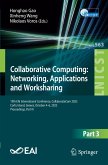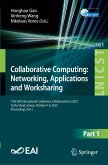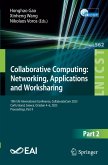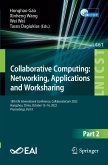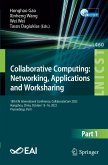Collaborative Computing: Networking, Applications and Worksharing
20th EAI International Conference, CollaborateCom 2024, Wuzhen, China, November 14-17, 2024, Proceedings, Part I
Herausgegeben:Gao, Honghao; Wang, Xinheng
Collaborative Computing: Networking, Applications and Worksharing
20th EAI International Conference, CollaborateCom 2024, Wuzhen, China, November 14-17, 2024, Proceedings, Part I
Herausgegeben:Gao, Honghao; Wang, Xinheng
- Broschiertes Buch
- Merkliste
- Auf die Merkliste
- Bewerten Bewerten
- Teilen
- Produkt teilen
- Produkterinnerung
- Produkterinnerung
The three-volume set LNICST 624, 625, 626 constitutes the refereed proceedings of the 20th EAI International Conference on Collaborative Computing: Networking, Applications and Worksharing, CollaborateCom 2024, held in Wuzhen, China, during November 14 17, 2024.
The 62 full papers were carefully reviewed and selected from 173 submissions. They are categorized under the topical sections as follows:
Edge computing & Task scheduling
Deep Learning and application
Blockchain applications
Security and Privacy Protection
Representation learning & Collaborative working
Graph…mehr
Andere Kunden interessierten sich auch für
![Collaborative Computing: Networking, Applications and Worksharing Collaborative Computing: Networking, Applications and Worksharing]() Collaborative Computing: Networking, Applications and Worksharing68,99 €
Collaborative Computing: Networking, Applications and Worksharing68,99 €![Collaborative Computing: Networking, Applications and Worksharing Collaborative Computing: Networking, Applications and Worksharing]() Collaborative Computing: Networking, Applications and Worksharing65,99 €
Collaborative Computing: Networking, Applications and Worksharing65,99 €![Collaborative Computing: Networking, Applications and Worksharing Collaborative Computing: Networking, Applications and Worksharing]() Collaborative Computing: Networking, Applications and Worksharing68,99 €
Collaborative Computing: Networking, Applications and Worksharing68,99 €![Collaborative Computing: Networking, Applications and Worksharing Collaborative Computing: Networking, Applications and Worksharing]() Collaborative Computing: Networking, Applications and Worksharing68,99 €
Collaborative Computing: Networking, Applications and Worksharing68,99 €![Collaborative Computing: Networking, Applications and Worksharing Collaborative Computing: Networking, Applications and Worksharing]() Collaborative Computing: Networking, Applications and Worksharing76,99 €
Collaborative Computing: Networking, Applications and Worksharing76,99 €![Collaborative Computing: Networking, Applications and Worksharing Collaborative Computing: Networking, Applications and Worksharing]() Collaborative Computing: Networking, Applications and Worksharing76,99 €
Collaborative Computing: Networking, Applications and Worksharing76,99 €![Collaborative Computing: Networking, Applications and Worksharing Collaborative Computing: Networking, Applications and Worksharing]() Collaborative Computing: Networking, Applications and Worksharing76,99 €
Collaborative Computing: Networking, Applications and Worksharing76,99 €-
-
-
The three-volume set LNICST 624, 625, 626 constitutes the refereed proceedings of the 20th EAI International Conference on Collaborative Computing: Networking, Applications and Worksharing, CollaborateCom 2024, held in Wuzhen, China, during November 14 17, 2024.
The 62 full papers were carefully reviewed and selected from 173 submissions. They are categorized under the topical sections as follows:
Edge computing & Task scheduling
Deep Learning and application
Blockchain applications
Security and Privacy Protection
Representation learning & Collaborative working
Graph neural networks & Recommendation systems
Federated Learning and application
The 62 full papers were carefully reviewed and selected from 173 submissions. They are categorized under the topical sections as follows:
Edge computing & Task scheduling
Deep Learning and application
Blockchain applications
Security and Privacy Protection
Representation learning & Collaborative working
Graph neural networks & Recommendation systems
Federated Learning and application
Produktdetails
- Produktdetails
- Lecture Notes of the Institute for Computer Sciences, Social Informatics and Telecommunications Enginee
- Verlag: Springer / Springer Nature Switzerland / Springer, Berlin
- Artikelnr. des Verlages: 978-3-031-93250-2
- Seitenzahl: 516
- Erscheinungstermin: 10. August 2025
- Englisch
- Abmessung: 235mm x 155mm x 28mm
- Gewicht: 774g
- ISBN-13: 9783031932502
- ISBN-10: 3031932501
- Artikelnr.: 73892600
- Herstellerkennzeichnung
- Springer-Verlag KG
- Sachsenplatz 4-6
- 1201 Wien, AT
- ProductSafety@springernature.com
- Lecture Notes of the Institute for Computer Sciences, Social Informatics and Telecommunications Enginee
- Verlag: Springer / Springer Nature Switzerland / Springer, Berlin
- Artikelnr. des Verlages: 978-3-031-93250-2
- Seitenzahl: 516
- Erscheinungstermin: 10. August 2025
- Englisch
- Abmessung: 235mm x 155mm x 28mm
- Gewicht: 774g
- ISBN-13: 9783031932502
- ISBN-10: 3031932501
- Artikelnr.: 73892600
- Herstellerkennzeichnung
- Springer-Verlag KG
- Sachsenplatz 4-6
- 1201 Wien, AT
- ProductSafety@springernature.com
Edge Computing & Task Scheduling.- Latency Energy aware Heterogeneous Resource Allocation and Task Scheduling in Industrial Cloud Edge Computing.- Backpressure-based Federated Learning Model Scheduling in Edge Computing.- Minimizing the Age of Knowledge in Application-oriented Mobile Edge Computing System with DRL-based Scheduling.- Dependency-Aware Task Offloading in Dynamic Network Environment with D2D Collaboration.- Delay Minimization for Downlink PD-NOMA Transmission with Index Coding in Cache-Aided Wireless Networks.- Fast Adaptive Caching Algorithm for Mobile Edge Networks Based on Meta-Reinforcement Learning.- Delay- and Cost-Aware Dynamic Service Migration in Collaborative Satellite Computing.- Towards Efficient Scheduling in Large Clusters Leveraging the Small-World Network Model.- A Dynamic Prioritization Task Offloading Strategy with Delay Constraints.- Task Scheduling Strategy among Multiple Local Mobile Clouds in Pervasive Edge Computing.- A Task Scheduling Strategy Based on Computing-Aware and Multi-Agent Collaborative Services in Pervasive Edge Computing.- Collaborative Vehicular Edge Cloud Computing Task Offloading Optimization Scheme Based on Deep Reinforcement Learning.- Deep Learning and Application.- NL-ATD: Spatio-Temporal Few-Shot Learning via Attention Transfer and Denoising Model.- A GCN-based DRL Approach for task migration and resource allocation in Heterogeneous Edge-Cloud Environments.- A Multi-Document Summarization Method for Customer Feedback Based on Large Language Models.- KaRe: Towards Flexible and Effective Machine Unlearning with Knowledge Alignment and Repair.- SWGCNN-BiLSTM: A Method for Detecting Unknown Attack Traffic within Imbalanced Samples.- Two-stage workflow scheduling based on deep reinforcement learning.- GRASP-SLAM: Gmapping-augmented DRL for Active SLAM using Policy gradient.- WiLDID:Low-Collaboration WiFi-Based Person Identification Via A Lightweight Deep Neural Network.- Dialogue Summarization by Integrating Structural Features and Improving Factual Consistency through Post-Editing.- TransAware: An Automatic Parallel Method for Deep Learning Model Training with Global Model Structure Awareness.- A Reliability Enhancement Scheme for Distributed Cloud Service Systems Based on Deep Reinforcement Learning.- Contrastive Learning-Based Finger-Vein Recognition Using Frequency-Mixup Augmentation and Time-Frequency Feature Fusion.- BACE-RUL: A Bi-directional Adversarial Network with Covariate Encoding for Machine Remaining Useful Life Prediction.
Edge Computing & Task Scheduling.- Latency Energy aware Heterogeneous Resource Allocation and Task Scheduling in Industrial Cloud Edge Computing.- Backpressure-based Federated Learning Model Scheduling in Edge Computing.- Minimizing the Age of Knowledge in Application-oriented Mobile Edge Computing System with DRL-based Scheduling.- Dependency-Aware Task Offloading in Dynamic Network Environment with D2D Collaboration.- Delay Minimization for Downlink PD-NOMA Transmission with Index Coding in Cache-Aided Wireless Networks.- Fast Adaptive Caching Algorithm for Mobile Edge Networks Based on Meta-Reinforcement Learning.- Delay- and Cost-Aware Dynamic Service Migration in Collaborative Satellite Computing.- Towards Efficient Scheduling in Large Clusters Leveraging the Small-World Network Model.- A Dynamic Prioritization Task Offloading Strategy with Delay Constraints.- Task Scheduling Strategy among Multiple Local Mobile Clouds in Pervasive Edge Computing.- A Task Scheduling Strategy Based on Computing-Aware and Multi-Agent Collaborative Services in Pervasive Edge Computing.- Collaborative Vehicular Edge Cloud Computing Task Offloading Optimization Scheme Based on Deep Reinforcement Learning.- Deep Learning and Application.- NL-ATD: Spatio-Temporal Few-Shot Learning via Attention Transfer and Denoising Model.- A GCN-based DRL Approach for task migration and resource allocation in Heterogeneous Edge-Cloud Environments.- A Multi-Document Summarization Method for Customer Feedback Based on Large Language Models.- KaRe: Towards Flexible and Effective Machine Unlearning with Knowledge Alignment and Repair.- SWGCNN-BiLSTM: A Method for Detecting Unknown Attack Traffic within Imbalanced Samples.- Two-stage workflow scheduling based on deep reinforcement learning.- GRASP-SLAM: Gmapping-augmented DRL for Active SLAM using Policy gradient.- WiLDID:Low-Collaboration WiFi-Based Person Identification Via A Lightweight Deep Neural Network.- Dialogue Summarization by Integrating Structural Features and Improving Factual Consistency through Post-Editing.- TransAware: An Automatic Parallel Method for Deep Learning Model Training with Global Model Structure Awareness.- A Reliability Enhancement Scheme for Distributed Cloud Service Systems Based on Deep Reinforcement Learning.- Contrastive Learning-Based Finger-Vein Recognition Using Frequency-Mixup Augmentation and Time-Frequency Feature Fusion.- BACE-RUL: A Bi-directional Adversarial Network with Covariate Encoding for Machine Remaining Useful Life Prediction.




